|
Welcome to Part 2 of the blog by Dr Stijn Thoolen, an ESA-sponsored medical doctor spending 12 months at Concordia research station in Antarctica. He facilitates a number of experiments on the effects of isolation, light deprivation, and extreme temperatures on the human body and mind.
Dr Stijn ThoolenMedical Research Doctor, Concordia Research Station, Antarctica November 8, 2019, somewhere above Asia I started early today, at 05:00 AM. Despite my sleep deprivation from a too long Nintendo farewell, I now jumped out of my friend’s bed without struggles. I give him, still half asleep, a last hug, and while I walk out of the door that radio in my head spontaneously starts playing again:
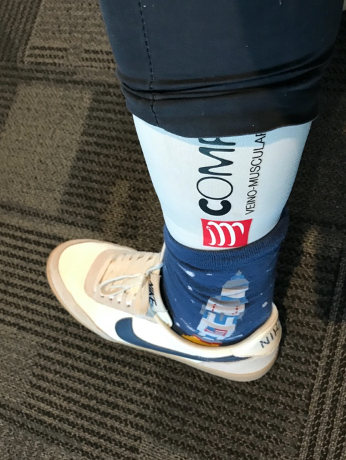 Liftoff! With 6 flights I figured to put on my compression socks… Credit: S. Thoolen Liftoff! With 6 flights I figured to put on my compression socks… Credit: S. Thoolen
Today it the day, finally. There have been few days in the past months where Concordia didn’t cross my mind. Enough thinking, enough talking, weeks of preparation and training, deadline after deadline finished: now it is time to make it happen! From Amsterdam to Paris, Hong Kong, Melbourne, Christchurch, and then off to the Antarctic, via the Italian coastal station Mario Zuccheli to our icy Dome C. It is only six flights and a day or five. What a party, and that fun is only further enhanced by all those happily-surprised faces of airport staff to whom I have to show my travel plans today (“Oh wow! Best of luck!”).
Today I am focused, bouncing from airport to airport full of curiosity, but the past few days were quite different. I have been ready for Concordia since the end of my training period early October, but over the past month more and more moments of realization squeezed through the goals and automatic pilot of my preparations, that I will really be away, for a full year, from about everything I see around me. Not that it bothered me much at first. It was quite funny actually (hah, Dutch gray rainy day, shall I miss you too?). But with my departure getting closer and the goodbyes less and less trivial, I was now getting overwhelmed with a feeling of uncertainty, a bit of fear perhaps, that I have not felt in years. So there I stood, sobbing and sniffling in my girlfriend’s arms at JFK airport in New York (you can imagine how awkward it is when at the same time a control-savoring security guard is screaming at you: “Sir, I need you to step out of the line, right now!”) 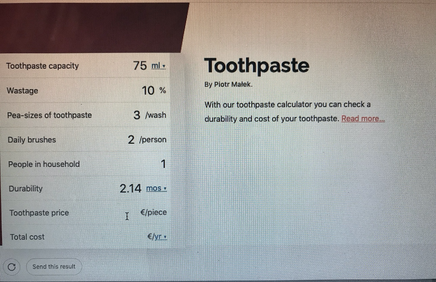 Amazing that someone has done the preparatory work. Thanks Piotr for the ‘toothpaste calculator’ Credit. S. Thoolen Amazing that someone has done the preparatory work. Thanks Piotr for the ‘toothpaste calculator’ Credit. S. Thoolen
Choices make things definitive, and a year Concordia is quite a big one. A huge leap that skips all check points, and requires all my confidence, that I have taken the right path. It is the same for her. And while I realize what a special, extraordinary future this will bring, my emotions appear to stay behind this time.
Still you can learn to accept, and that is pretty useful when preparing for something like Concordia. Trust in your choices, say goodbye, and move forward, even if the road ahead is unclear. I already left my comfort zone a while ago, but this summer that feeling intensified when I had to pack my personal belongings for an entire year on ice. What the hell would you bring in your suitcase, for an entire year on ice? Fifteen pairs and seven different types of gloves from the French Polar Institute (Do you think I sent them the right sizes?), three laptops (I can’t really send it back for repair, so everything in reserve, and perhaps a reserve for the reserve), a handful of rechargeable batteries, 780 contact lenses with the best wishes from the optician, 11 tubes of toothpaste, 2.5 liters of body lotion and 500 ml of Vaseline (drier than the Sahara, remember?), 500 tablets of vitamin D (sun replacement) plus another bag of nutritional supplements, two pairs of running shoes, a book or ten of complicated literature, about 20 kilos of fun material and 100 ‘stroopwaffles’ were some of the highlights. With 110 kilos per ship and another 24 per plane, I may be a little over-packed, a reflection perhaps of the uncertainty (“you never know”) of a true inexperienced first-year winteroverer. But with 110 kilos of choices less, it was quite a relief when those boxes finally left the door last August for their 3-month world trip towards the south pole. Is the happy song still playing? 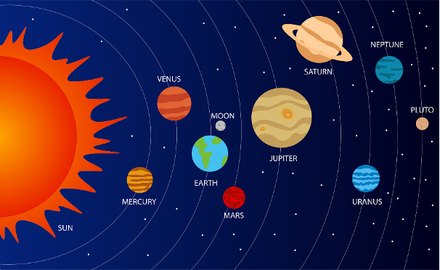 Maybe I was wise not to provide a full inventory list, but the success of a winter-over in Antarctica lies with a healthy crew, and for a healthy crew I like to think that confetti and bubbles are more important than an extra pair of underpants… Credit: S. Thoolen Maybe I was wise not to provide a full inventory list, but the success of a winter-over in Antarctica lies with a healthy crew, and for a healthy crew I like to think that confetti and bubbles are more important than an extra pair of underpants… Credit: S. Thoolen
Things went quickly afterwards. In one and a half month I have been inspired by the researchers in Germany, France and Italy and their experiments I am going to carry out next year; I practiced, in my best French, rescue techniques (in case of emergency I lead the rescue team) during a week in the mountains of Chamonix, France; I got introduced to the water recycling system developed in collaboration with ESA and tested at Concordia in preparation for future space missions (I will test the water quality); and I got acquainted with the French Polar Institute IPEV. It is impressive, not only the amount of kilometers that can be crammed into one month, or the amount of cheese that I was served with each meal, but especially all those wonderful people I met, who are working behind the scenes to make this whole undertaking possible.
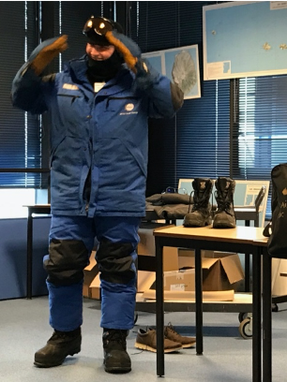 Fashion show at IPEV. My polar gear is carefully selected and demonstrated. Credits: IPEV/PNRA Fashion show at IPEV. My polar gear is carefully selected and demonstrated. Credits: IPEV/PNRA
What a privilege to be part of such a special organization, and to get to know all those mechanics, plumbers, electricians, doctors, glaciologists, ornithologists, and all those other -ologists who I thought only existed on the BBC, and with whom I may share this big winterover adventure in the French Southern and Antarctic Territories. Concordia really started to become reality now, and that enthusiasm only grew when I finally met the rest of the Concordia “DC16” crew at the end of September for a week of team building and psychological training, somewhere in a remote piece of the French Alps. Cooking together, camping together, and telling each other what we hate. I am confident everything will work out fine! But with every completed task, Concordia comes a little closer, and so does the time to say goodbye to family and friends. Two nights ago we came together with the family, and with their tears I realized once again how this adventure does not just concern me. They are also forced, actually, to turn into that path of uncertainty, and so we influence each other, dependent, perhaps just like the entire DC16 crew, whose well-being will largely determine the success of our winterover. Or think of those heroes behind the scenes at IPEV, without whom I would never sit in this plane, and Piotr of course, and his toothpaste calculator.
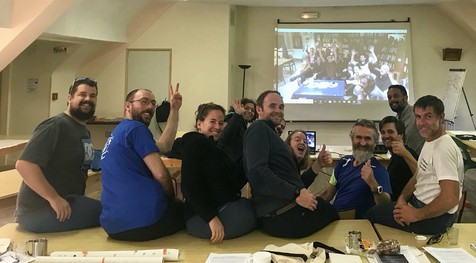 Six French, four Italians, and a Dutchman during a preparatory Skype session in France with the ‘DC15’ crew from Concordia. Credits: IPEV/PNRA Six French, four Italians, and a Dutchman during a preparatory Skype session in France with the ‘DC15’ crew from Concordia. Credits: IPEV/PNRA
Sometimes I wonder if I should expect all this flexibility around me. I am really happy and grateful that I have received so much support for this crazy adventure. That is not always easy. But maybe my father was right after all, and is it this very same dependency, in which we are forced to take on the challenge together, that gives us the opportunity to connect (sounds somewhat logical…). Then let us hope that we can face many more challenges together, with trust, as my mother wrote to me, in each other’s choices, and in a happy ending. All these tears reflected healthy emotions, for which perhaps no preparation will ever be enough. It made a beautiful goodbye, and a valuable memory.
Comments are closed.
|
Welcometo the InnovaSpace Knowledge Station Categories
All
|
InnovaSpace Ltd - Registered in England & Wales - No. 11323249
UK Office: 88 Tideslea Path, London, SE280LZ
Privacy Policy I Terms & Conditions
© 2024 InnovaSpace, All Rights Reserved
UK Office: 88 Tideslea Path, London, SE280LZ
Privacy Policy I Terms & Conditions
© 2024 InnovaSpace, All Rights Reserved
 RSS Feed
RSS Feed